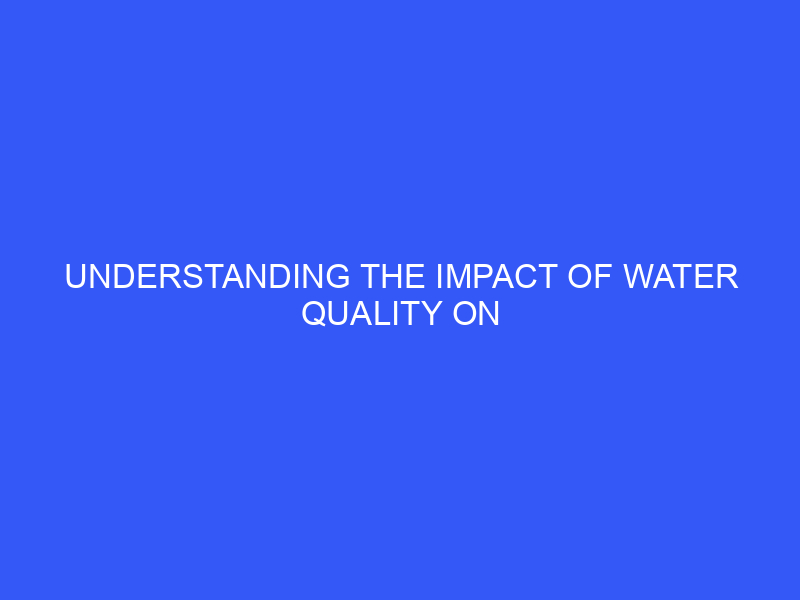We often ignore the water quality going through our pipes, a critical aspect of plumbing maintenance. Hard water contains a high mineral concentration and can damage our plumbing systems over time.
Investigating the Impacts of Hard Water on Plumbing Maintenance
In this blog post, we’ll look at the consequences of hard water on plumbing maintenance and how it can reduce the life of our pipes and fixtures.
What is Hard Water?
Hard water has a high mineral concentration, primarily calcium and magnesium. As the water flows through rocks and soil, these minerals dissolve, making it mineral-rich. While hard water is safe to drink, it can cause various plumbing problems.
Hard Water’s Impact on Plumbing Systems
Buildup of Mineral Deposits
One of the most noticeable effects of hard water is the accumulation of mineral deposits, known as limescale, within our plumbing systems. These deposits build up over time in pipes, fixtures, and appliances, restricting water flow and decreasing efficiency. If not repaired promptly, this can result in jams, reduced water pressure, and even entire blockage.
Corrosion of Pipes and Fixtures
Hard water can also hasten the corrosion of pipelines and fixtures, particularly metal ones.
The minerals in the water react with the metal, making it crumble quicker than it would with soft water. This erosion debilitates the respectability of the plumbing system and can prompt leaks, burst pipes, and expensive repairs.
Reduced Lifespan of Appliances
Water heaters, dishwashers, and washing machines are all affected by hard water.
Water salts settle within these appliances, causing scaling and clogging of internal components. This can lead to lower efficiency, higher energy consumption, and, eventually, a shorter lifespan for these equipment.
Increased Energy Consumption
Limescale deposits that accumulate within pipes and appliances act as an insulator. This insulation inhibits efficient heat transfer, requiring appliances such as water heaters to spend more energy to achieve the target temperature. This results in more lavish utility bills and an unneeded environmental burden.
Key Takeaway: Because limescale deposits hinder appliance heat transfer, hard water can increase energy usage.
Preventing and Treating Hard Water
While the consequences of hard water on plumbing maintenance can be alarming, there are steps homeowners can take to reduce these problems.
Water Softeners
Installing a water softener is the most popular solution for dealing with hard water. Water softeners remove minerals from water by exchanging calcium and magnesium ions for sodium or potassium ions. This prevents limescale formation and lessens the harmful impact on plumbing systems. Installing a water softener removes minerals from water and prevents limescale buildup.
Descale Regularly
Descaling appliances, pipes, and fixtures can also assist in battling the effects of hard water. Homeowners may remove mineral deposits and keep their plumbing system running smoothly using vinegar or a specialist descaling solution.
Filtered Water for Appliances
Filtered water can reduce the mineral content of equipment like washing machines and dishwashers. This decreases the possibility of scaling and clogging, extending the life of this equipment.
Conclusion
Understanding the consequences of hard water is critical for plumbing repair. Hard water causes mineral deposits to accumulate, corrosion of pipes and fixtures, decreased appliance lifespan, and increased energy usage. Homeowners can safeguard their plumbing system and avoid costly repairs by taking preventative measures such as installing water softeners, regular descaling, and utilizing filtered water. Don’t allow hard water to damage your plumbing system; take action now!
The Correlation Between Plumbing Lifespan and Water Quality
The Role of Water Quality
The chemical, physical, and biological properties of water are referred to as its quality. Impurities such as minerals, sediments, chemicals, and bacteria can substantially impact the performance and durability of plumbing systems.
Here are a few significant criteria that demonstrate the connection between water quality and plumbing lifespan:
Corrosion and Scale Buildup
Water with a high mineral concentration can cause corrosion and scale accumulation in your pipes. Corrosion corrodes the lines, making them vulnerable to leaks and breakage.
Scale clogs pipes and affects the efficiency of plumbing fixtures and appliances.
Bacterial Growth
Bacteria can thrive in improperly disinfected or stagnant water.
Bacterial development in plumbing systems can cause unpleasant odors, discoloration, and health hazards. Microbial contamination can degrade pipelines, causing them to fail prematurely.
Chemical Reactions
Water-borne chemicals such as chlorine, chloramine, and fluoride can react with plumbing materials. These processes can hasten corrosion, ruin seals, and shorten the lifespan of plumbing fittings.
Water Pressure Variations
Water pressure fluctuations can place a strain on plumbing systems. Low water pressure can cause sediments to settle in the pipes, clogging and limiting water flow. High water pressure can cause pipe bursts or appliance damage.
The Importance of Maintaining Optimum Water Quality
Maintaining proper water quality is crucial for the longevity and functionality of your plumbing system. The following are some of the critical advantages of providing acceptable water quality:
- Lifespan: Good water quality prevents corrosion, scale accumulation, and chemical reactions, extending the life of your plumbing system.
- Reduced Repairs: Because good water quality minimizes the likelihood of plumbing issues, fewer repairs and associated expenses are required.
- Improved Performance: High-quality water provides efficient flow, correct fixture operation, and overall performance.
- Improved Health and Safety: Keeping water clean and disinfected decreases the danger of bacterial contamination and other health risks.
Here are some critical lessons to remember now that you understand the impact of water quality on your plumbing system:
- Poor water quality can cause corrosion, scale accumulation, bacterial development, and chemical reactions in your plumbing system, reducing lifespan.
- Maintaining optimal water quality helps your plumbing system last longer and reduces the need for repairs.
- Test and treat your water regularly to ensure it satisfies the required quality standards.
- Consider utilizing water filters, softeners, or conditioners to improve water quality.
- Consult a skilled plumber for routine maintenance and advice on optimum water quality.
Remember that water quality is more than simply how your drinking water tastes and looks. It is crucial to the longevity and performance of your plumbing system.
You can safeguard the long-term performance of your pipes, fixtures, and appliances by proactively preserving optimum water quality.
How Water Quality Affects the Efficiency of Your Plumbing System
Water Quality’s Influence on Plumbing Systems
- Pipe Corrosion: High levels of minerals like iron, calcium, and magnesium in water can prompt the corrosion of pipes. Over the long run, corroded pipes can debilitate, foster leaks, or even burst, bringing about costly fixes and water damage.
- Scale Buildup: Hard water has an abundance of minerals, which collect inside pipes, water heaters, and appliances. This scale accumulation slows water flow, reduces water pressure, and reduces the overall efficiency of your plumbing system.
- Drain Clogs: Minerals, sediments, and debris in water can all contribute to clogged drains and blockages. This can cause delayed drainage, foul odors, and backflow problems.
- Appliance Life expectancy: Water quality likewise influences the life expectancy and performance of different appliances in your home. Appliances like dishwashers, washing machines, and water heaters are especially defenseless to the adverse effects of mineral-rich water.
Improving Water Quality for Plumbing Efficiency
- Water Softening: Investing in a water softener can be an efficient way to deal with hard water. Water softeners remove excess minerals, avoiding scale accumulation and extending the life and efficiency of your plumbing system. Softer skin, shinier hair, and longer-lasting appliances are all advantages of softened water.
- Filtration Sytems: Introducing water filtration systems can assist with eliminating contaminations and foreign substances from the water supply. Filtration systems come in different kinds, for example, enacted carbon filters, turn-around assimilation frameworks, and sediment filters, guaranteeing spotless and safe water courses through your plumbing system.
- Regular Maintenance: Consistently keeping up with your plumbing system, including flushing the water heater to eliminate sediment and trash, can assist with saving its effectiveness and expand its life expectancy. Proficient reviews and support by an authorized plumber should be once a year.
In Conclusion
Guaranteeing excellent water quality isn’t just fundamental for your well-being and keeping a productive plumbing system. The presence of minerals, pollutants, and foreign substances can prompt different plumbing issues, from pipe corrosion and scale development to obstructed drains and diminished appliance life expectancy. By putting resources into water softeners, filtration systems, and ordinary maintenance, you can further develop water quality and expand the life expectancy of your plumbing system, saving you from costly fixes over the long haul.
Why Is Water Quality Testing Important for Plumbing Durability?
However, numerous people need to focus harder on the meaning of water quality in guaranteeing the life span of their plumbing system. Here, we will see why water quality testing is fundamental and what it could mean for the life expectancy of your plumbing.
The Significance of Water Quality Testing
Because of its capacity to dissolve a wide range of compounds, water is often called the “universal solvent.” However, if the water supply contains too many minerals, pollutants, or chemicals, this property might harm your plumbing system.
These compounds can cause various problems over time, resulting in substantial damage and costly repairs. Regular water quality monitoring is essential for recognizing and correcting possible issues before they worsen.
Water Quality Testing Benefits and Features:
- Identifying hazardous contaminants: Water quality testing identifies potentially dangerous elements in your water source, such as heavy metals, microbes, pesticides, or high chlorine levels.
- Detection of hard water: Due to its high mineral content, hard water can cause limescale buildup in pipes and appliances. Water quality testing measures the hardness of your water, enabling you to take the required precautions to avoid scale buildup.
- Preventing corrosive effects: High acidity or alkalinity of water can consume pipes, fittings, and installations, causing spills or untimely failure. By testing the pH level of your water, you can find proactive ways to kill its corrosive impacts.
- Prolonged plumbing system lifespan: Regular water quality testing helps you preserve the integrity of your plumbing system, lowering the danger of unexpected breakdowns and increasing its lifespan.
FAQ’S
What constitutes water quality?
Water quality refers to the state of water, which includes its chemical, physical, and biological aspects and suitability for a specific function, such as drinking or swimming.
What role does water quality play?
Maintain water quality to guarantee that humans, wildlife, and marine life may have it safely. Assessing water quality in ports is crucial for understanding environmental implications and avoiding harm to sea life.
How do you analyze water quality?
Temperature, dissolved oxygen, pH, conductivity, ORP, and turbidity are all parameters commonly sampled or monitored for water quality. Water monitoring includes monitoring total algae, ISEs (ammonia, nitrate, chloride), or laboratory parameters such as BOD, titration, or TOC.


